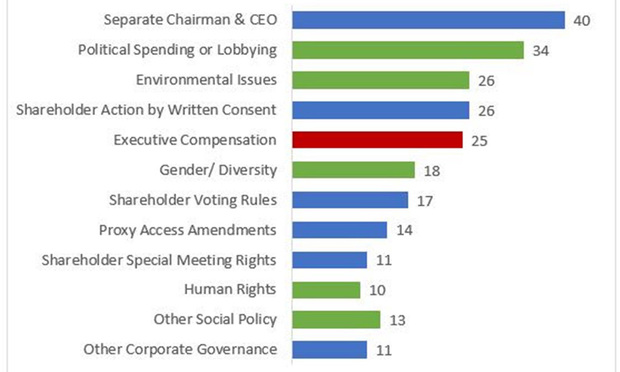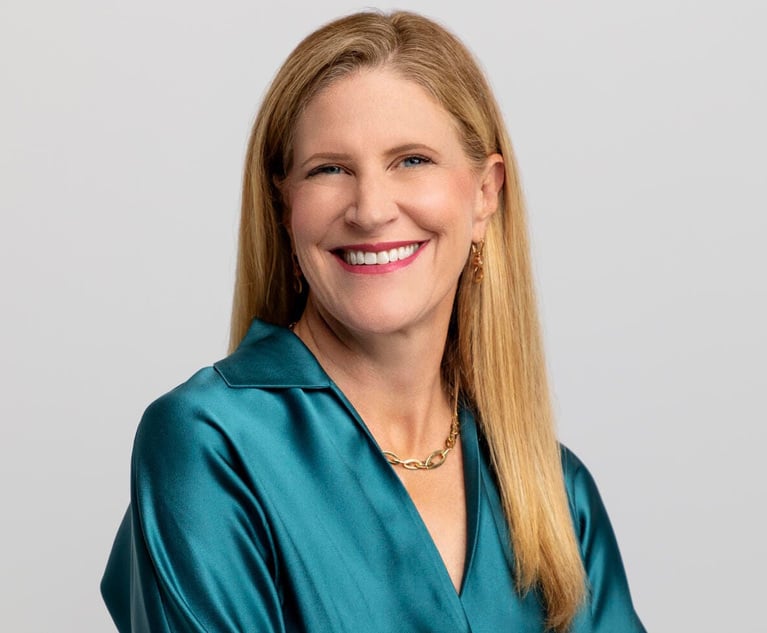Roller Coaster Proxy Season Ends as US Regulators Look at Possible Changes
Both shareholder activists and corporate management claimed victories, suffered losses, and see a cloudy future with the U.S. Securities and Exchange Commission considering proxy changes.
August 01, 2019 at 06:09 PM
5 minute read
 James Copland, senior fellow and legal policy director at the Manhattan Institute for Policy Research.
James Copland, senior fellow and legal policy director at the Manhattan Institute for Policy Research.
General counsel can now sigh with relief—the 2019 proxy season has closed, and their companies can examine what the votes really meant.
Both shareholder activists and corporate management claimed victories, suffered losses, and see a cloudy future with the U.S. Securities and Exchange Commission considering proxy changes.
James Copland, senior fellow and legal policy director at the Manhattan Institute for Policy Research, noted that only 6% of shareholder proposals received majority votes—down considerably from 11% in 2017 and 10% in 2018. That’s a positive trend to Copland, whose organization is a pro-business, free market think tank that produces the ProxyMonitor.org database.
 Number of Shareholder Proposals by Type, 2019 (Fortune 250) Photo: Manhattan Institute for Policy Research
Number of Shareholder Proposals by Type, 2019 (Fortune 250) Photo: Manhattan Institute for Policy ResearchOf the 275 proposals at Fortune 250 firms in 2019, the data show that 40 resolutions requested companies to split their chairman and CEO roles. It was the most frequent type of resolution. All 40 failed.
Copland said he thinks management was able to defeat the proposals because there is “no clear empirical statement that separating these positions generates share value.”
He explained, “The broader issue here is investors are loathe to go with a one-size-fits-all governance structure. These usually pass only if there’s a problem at the company. Shareholders are not going to rock the boat if the company is doing well.”
On the other hand, activist shareholders can point to three social-issue proposals that received majority votes: One seeking a report on corporate political spending at Cognizant Technology Solutions; one requesting a report on risks from opioid sales at Walgreens Boots Alliance; and one asking for a report on diversity, including the company’s Equal Employment Opportunity Commission data, at the Travelers Companies Inc.
But observers can’t just look at what proposals won a majority vote, according to Danielle Fugere, president and chief counsel for As You Sow, a nonprofit group promoting environmental and social corporate responsibility. The group frequently supports environmental and social proxy proposals.
“It was a very good season for working with companies,” Fugere said. “We were able to achieve many withdrawals of proposals in exchange for a company’s commitment to act.”
She pointed to agreements and withdrawn resolutions on climate change at American International Group Inc., Amazon.com Inc., General Electric Co. and Verizon; on gender diversity at Caesars Entertainment and Eastman Kodak Co.; and on plastic pellet pollution at Chevron Corp., Exxon Mobil Corp. and Phillips 66 Co.
When proposals did go to a vote, Fugere said the resolutions often earned tallies in the 30% and 40% ranges. “There’s no 50% requirement here,” Fugere explained. “The proposals are not mandatory; they are requests. If you get one in three shareholders, that is a strong signal to the company that it needs to take some action or shareholder pressure will increase.”
She cited as good signs a 33% vote on a climate change resolution at Chevron; a 42% vote on mitigating health risks of coal at Duke Energy Corp.; and a 44% vote on consumer packaging at Starbucks Coffee Co.
“And a petrochemical resolution at Exxon got 25%,” Fugere added. “That’s important because it was the first year for this proposal and 25% is high for the first time.”
Both Copland and Fugere spoke of problems with how the SEC handles the proxy process.
Fugere said the SEC blocked climate change proposals from the ballot this year that would have appeared in prior years. “I think it’s political,” she said. “I saw it particularly in the oil and gas arena. In some cases [the SEC] said companies had substantially already complied with a request, when in fact they hadn’t.”
Copland co-authored a report last year calling for proxy reforms, such as eliminating the requirement that institutional investors vote all items on a proxy statement; or adopting standards to improve proxy advisory firms’ accuracy, transparency and accountability. He said he really hadn’t seen any progress made on such measures in 2019.
Copland noted the SEC held a proxy roundtable last November to discuss possible changes, and it has put the process on its rulemaking agenda.
“I do think there’s a consensus among commissioners to do something,” he said. He argued that something is clearly wrong when three “gadfly” activists can dominate the proxy process, as happened in 2019 when they filed 38% of the proposals.
Fugere, however, argued against changes that might tamp down shareholder activism.
“There is just no proof that there is an existing problem here,” she said. “The success of shareholders in engaging companies on environmental, social and governance issues is driving the call for change. But success in moving companies to do better for the world and for the company and for shareholders is not a problem.”
Fugere said the proxy process was created to give shareholders more input, and it is doing that.
“The fact that support rates [on proposals] are increasing shows what shareholders care about, and it flies in the face of saying that it needs to be slowed down. The system is working now.”
This content has been archived. It is available through our partners, LexisNexis® and Bloomberg Law.
To view this content, please continue to their sites.
Not a Lexis Subscriber?
Subscribe Now
Not a Bloomberg Law Subscriber?
Subscribe Now
NOT FOR REPRINT
© 2025 ALM Global, LLC, All Rights Reserved. Request academic re-use from www.copyright.com. All other uses, submit a request to [email protected]. For more information visit Asset & Logo Licensing.
You Might Like
View All
John Deere Annual Meeting Offers Peek Into DEI Strife That Looms for Companies Nationwide
7 minute read
Wells Fargo and Bank of America Agree to Pay Combined $60 Million to Settle SEC Probe

Former Capital One Deputy GC Takes Legal Reins of AIG Spinoff

Ex-Six Flags CLO Lands New C-Suite Post—This Time as HR Chief
Trending Stories
- 1Recent Controversial Decision and Insurance Law May Mitigate Exposure for Companies Subject to False Claims Act Lawsuits
- 2Visa Revocation and Removal: Can the New Administration Remove Foreign Nationals for Past Advocacy?
- 3Your Communications Are Not Secure! What Legal Professionals Need to Know
- 4Legal Leaders Need To Create A High-Trust Culture
- 5There's a New Chief Judge in Town: Meet the Top Miami Jurist
Who Got The Work
J. Brugh Lower of Gibbons has entered an appearance for industrial equipment supplier Devco Corporation in a pending trademark infringement lawsuit. The suit, accusing the defendant of selling knock-off Graco products, was filed Dec. 18 in New Jersey District Court by Rivkin Radler on behalf of Graco Inc. and Graco Minnesota. The case, assigned to U.S. District Judge Zahid N. Quraishi, is 3:24-cv-11294, Graco Inc. et al v. Devco Corporation.
Who Got The Work
Rebecca Maller-Stein and Kent A. Yalowitz of Arnold & Porter Kaye Scholer have entered their appearances for Hanaco Venture Capital and its executives, Lior Prosor and David Frankel, in a pending securities lawsuit. The action, filed on Dec. 24 in New York Southern District Court by Zell, Aron & Co. on behalf of Goldeneye Advisors, accuses the defendants of negligently and fraudulently managing the plaintiff's $1 million investment. The case, assigned to U.S. District Judge Vernon S. Broderick, is 1:24-cv-09918, Goldeneye Advisors, LLC v. Hanaco Venture Capital, Ltd. et al.
Who Got The Work
Attorneys from A&O Shearman has stepped in as defense counsel for Toronto-Dominion Bank and other defendants in a pending securities class action. The suit, filed Dec. 11 in New York Southern District Court by Bleichmar Fonti & Auld, accuses the defendants of concealing the bank's 'pervasive' deficiencies in regards to its compliance with the Bank Secrecy Act and the quality of its anti-money laundering controls. The case, assigned to U.S. District Judge Arun Subramanian, is 1:24-cv-09445, Gonzalez v. The Toronto-Dominion Bank et al.
Who Got The Work
Crown Castle International, a Pennsylvania company providing shared communications infrastructure, has turned to Luke D. Wolf of Gordon Rees Scully Mansukhani to fend off a pending breach-of-contract lawsuit. The court action, filed Nov. 25 in Michigan Eastern District Court by Hooper Hathaway PC on behalf of The Town Residences LLC, accuses Crown Castle of failing to transfer approximately $30,000 in utility payments from T-Mobile in breach of a roof-top lease and assignment agreement. The case, assigned to U.S. District Judge Susan K. Declercq, is 2:24-cv-13131, The Town Residences LLC v. T-Mobile US, Inc. et al.
Who Got The Work
Wilfred P. Coronato and Daniel M. Schwartz of McCarter & English have stepped in as defense counsel to Electrolux Home Products Inc. in a pending product liability lawsuit. The court action, filed Nov. 26 in New York Eastern District Court by Poulos Lopiccolo PC and Nagel Rice LLP on behalf of David Stern, alleges that the defendant's refrigerators’ drawers and shelving repeatedly break and fall apart within months after purchase. The case, assigned to U.S. District Judge Joan M. Azrack, is 2:24-cv-08204, Stern v. Electrolux Home Products, Inc.
Featured Firms
Law Offices of Gary Martin Hays & Associates, P.C.
(470) 294-1674
Law Offices of Mark E. Salomone
(857) 444-6468
Smith & Hassler
(713) 739-1250






